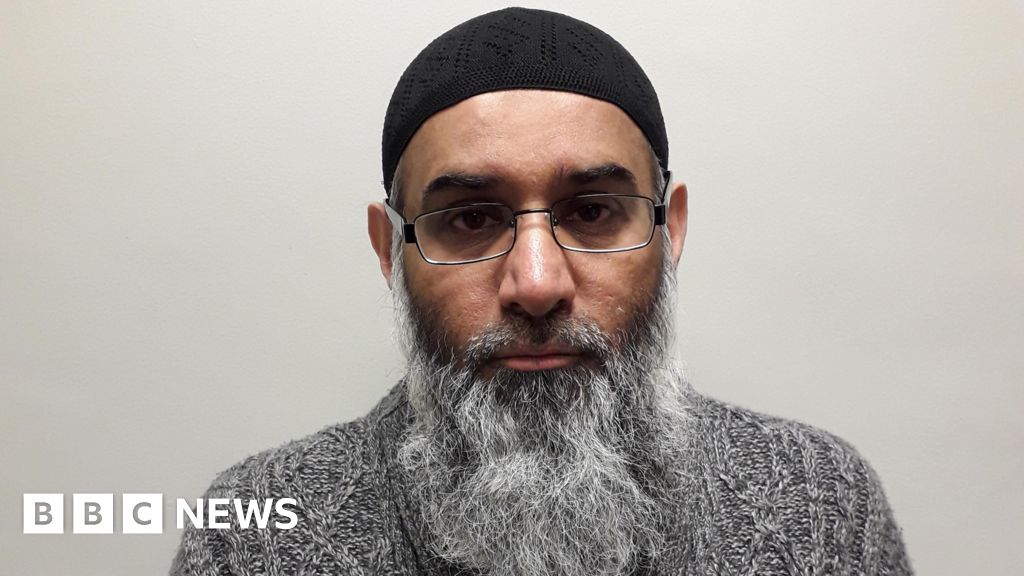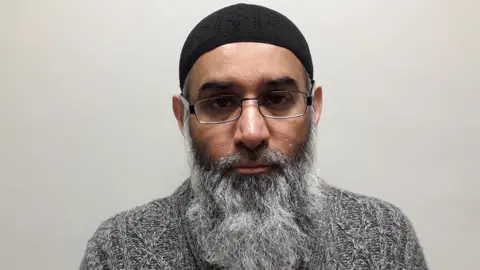
 Met Police
Met PoliceAnjem Choudary, the leader of the banned group al-Muhajiroun, has been jailed for life and may never leave prison alive.
The extremist preacher was found guilty of directing the group, which is banned under UK terror laws, and encouraging support for it through online meetings.
The sentence means he cannot seek to leave jail on licence until he is more than 85 years old.
Choudary appeared shocked and rocked on his feet in the dock as he was given a minimum term of 28 years at Woolwich Crown Court.
He was convicted last week of directing a terror organisation after a complex operation involving detectives and investigators in the US, Canada and the UK.
Mr Justice Wall said Choudary’s group was a radical organisation that intended to spread sharia law, by violent means, to as much of the world as possible.
Choudary, one of the most notorious radicalisers in the UK, was caught after an international undercover investigation proved that the long-banned al-Muhajiroun network that he headed was still operating in 2021 – and trying to recruit new followers under a false name in North America.
Al-Muhajiroun, which emerged in the late 1990s, has been linked to dozens of acts of terrorism with followers committing acts of violence both at home and abroad.
Choudary has been at the heart of the organisation since its earliest days and became leader in 2014 after its founder was jailed in Lebanon.
The 57-year-old’s imprisonment relates to his attempts to redevelop the network in 2021, after his release from a five-and-a-half year prison sentence for inviting his followers to support the Islamic State fighters in Syria.
Once freed of that sentence, Choudary began holding online lectures with followers in North America.
But he did not realise that his online talks promoting jihadist ideology had been infiltrated by undercover officers from Canadian and US security services.
Mr Justice Wall said that in approximately 30 lectures Choudary had encouraged members of the “Islamic Thinkers Society” – a codename for the al-Muhajiroun network – into confrontational street preaching and acts of violence.
“You thinly disguised these exhortations as lessons in Islamic theology,” said the judge, adding that Choudary knew members of the organisation would carry out acts of violence, whether or not he was personally involved.
‘Normalise violence’
“Organisations such as yours normalise violence in pursuit of an ideological cause,” said the judge.
“They drive wedges between people who would otherwise live together in peaceful co-existence. Your behaviour was of the highest culpability.”
Turning to the group’s history, the judge said Choudary’s followers had included Siddhartha Dhar, a key lieutenant, who had joined the Islamic State group in Syria and murdered its captives.
More recently, in 2023, two Birmingham brothers were jailed after admitting they had planned to join the Islamic State group’s Afghanistan branch. One of them, Muhammad Hamza Heyder Khan, had specifically described Choudary as an inspiration.
“I am sure that you will continue to preach your message of hate and division when or if you are given the opportunity to do so in the future. You are not someone who can be diverted from that course by any form of intervention,” said the judge.
“The danger you pose is in your organisational skills and your skills as an orator rather than as a man who uses violence personally. I cannot foresee a time when you will cease to be dangerous in that way.”
Choudary’s co-accused, Canadian Khaled Hussein, who was convicted of being a member of al-Muhajiroun, was jailed for five years, with an additional year on a supervision licence after his release.
Earlier in the hearing, Paul Hynes KC, for Choudary, argued that whatever the jury’s verdict, al-Muhajiroun was nothing like al-Qaeda or Islamic State.
“We are left with dense theological lectures which are not particularly accessible,” he said.
“We do not see that the court is in a position… to conclude that Mr Choudary was gathering the masses. It was a failed organisation.”